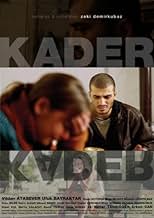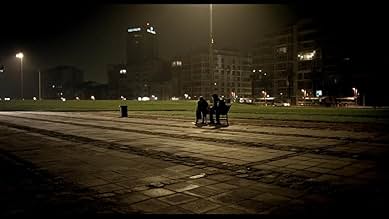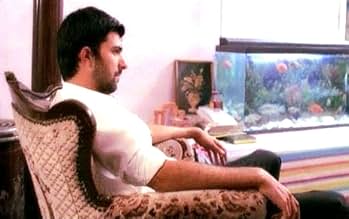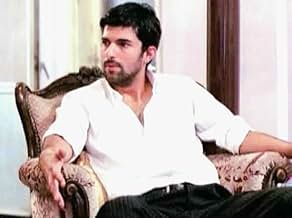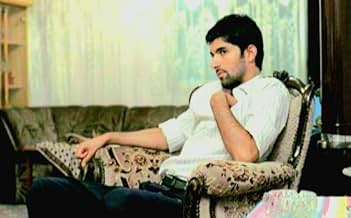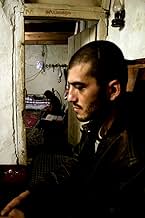Kader
- 2006
- 1h 43min
CALIFICACIÓN DE IMDb
7.7/10
19 k
TU CALIFICACIÓN
Agrega una trama en tu idiomaBekir loves Ugur, who loves Zagor, who is about to get out of jail. An already tense love triangle is thrown into turmoil on a hot summer night, when Zagor kills someone, and Ugur disappears... Leer todoBekir loves Ugur, who loves Zagor, who is about to get out of jail. An already tense love triangle is thrown into turmoil on a hot summer night, when Zagor kills someone, and Ugur disappears.Bekir loves Ugur, who loves Zagor, who is about to get out of jail. An already tense love triangle is thrown into turmoil on a hot summer night, when Zagor kills someone, and Ugur disappears.
- Premios
- 10 premios ganados y 9 nominaciones en total
Apo Demirkubuz
- Muzo
- (as Abdullah Demirkubuz)
- Dirección
- Guionista
- Todo el elenco y el equipo
- Producción, taquilla y más en IMDbPro
Opiniones destacadas
Bekir is married,has two kids.But he loves Ugur,he goes wherever she goes.Ugur is a bar singer,she loves Zagor,she goes wherever Zagor goes.Zagor is a cop killer,he visits prisons all over in Turkey.An endless story about two lovers...
A great story written,photographed and directed by Zeki Demirkubuz.Well acted at the same time.Vildan Atasever as Ugur.Now one of the most talented actresses in Turkey.And especially Ufuk Bayraktar as Bekir.Watching his change in the role is really fascinating.The movie,the cast and the crew everyone deserved the Altin Portakal.Congratulations...
A great story written,photographed and directed by Zeki Demirkubuz.Well acted at the same time.Vildan Atasever as Ugur.Now one of the most talented actresses in Turkey.And especially Ufuk Bayraktar as Bekir.Watching his change in the role is really fascinating.The movie,the cast and the crew everyone deserved the Altin Portakal.Congratulations...
Imagine a film, that makes you feel the hardness of the pavement you hit your head onto, once again. Imagine a film, the only thing you can do after leaving the cinema is shutting up your mouth. Imagine a film, that tells you the inside world of the taxi driver who is driving you home or to work.
This is thematic continuation of Masumiyet, but more in the flashback mode and hits much powerful than Masumiyet, although with a less experienced cast. The story tells us how the love of Bekir and Ugur (continued characters in Masumiyet) began, and the surroundings of them in their youth. But ! this is the apparent, the easily visible part of that film! The more important thematic gem, is the surroundings of these two characters, which appropriately fits the living-cultural-social conditions of the big populated suburbs of big cities of Turkey. This is not a documentary and not a love story with its simplest meaning and it is not realism; it is the reality itself. It's bone hard, that pulls you into the living of the 'damned', as termed by the bourgeois or religious jargon. The acting is, though Vildan Atasever got so much negative critics (my opinion, she is the leading cast, a very talented artist) superb. Keep also in mind that certain camera angels in very small locations are used masterfully. The story: do not look to the apparent love story going on ! Try to understand those circumstances and those people. People live the lives of conditions they are born into. It is a everyday news here in Turkey, that some people kill some other for not any reason that could be put into the borders of "western rationality". The best explaining word for this movie is a German word: Knallhart ! (not implying the film knallhart-2006 in any way) translated as tough enough, but which explains a more dramatic condition. That film is a real Knallhart of the last few years not only in the name of Turkish movie making. You can observe these lives in Barcelona, Rome, Berlin, and maybe all Latin America. For those watching this film with translation, either dubbed or subbed, many of the dialogs, i guess, will be more softly pronounced. Linguistic is the heart of a culture. And, Demirkubuz made his masterpiece by pulling out the heart of the streets of its shell and bringing it to the world of cinema. There is a world going on with very simple rules, when you are asleep.
and finally some trivial: Demirkubuz's 2001 movie Yazgi means also destiny or fate.
This is thematic continuation of Masumiyet, but more in the flashback mode and hits much powerful than Masumiyet, although with a less experienced cast. The story tells us how the love of Bekir and Ugur (continued characters in Masumiyet) began, and the surroundings of them in their youth. But ! this is the apparent, the easily visible part of that film! The more important thematic gem, is the surroundings of these two characters, which appropriately fits the living-cultural-social conditions of the big populated suburbs of big cities of Turkey. This is not a documentary and not a love story with its simplest meaning and it is not realism; it is the reality itself. It's bone hard, that pulls you into the living of the 'damned', as termed by the bourgeois or religious jargon. The acting is, though Vildan Atasever got so much negative critics (my opinion, she is the leading cast, a very talented artist) superb. Keep also in mind that certain camera angels in very small locations are used masterfully. The story: do not look to the apparent love story going on ! Try to understand those circumstances and those people. People live the lives of conditions they are born into. It is a everyday news here in Turkey, that some people kill some other for not any reason that could be put into the borders of "western rationality". The best explaining word for this movie is a German word: Knallhart ! (not implying the film knallhart-2006 in any way) translated as tough enough, but which explains a more dramatic condition. That film is a real Knallhart of the last few years not only in the name of Turkish movie making. You can observe these lives in Barcelona, Rome, Berlin, and maybe all Latin America. For those watching this film with translation, either dubbed or subbed, many of the dialogs, i guess, will be more softly pronounced. Linguistic is the heart of a culture. And, Demirkubuz made his masterpiece by pulling out the heart of the streets of its shell and bringing it to the world of cinema. There is a world going on with very simple rules, when you are asleep.
and finally some trivial: Demirkubuz's 2001 movie Yazgi means also destiny or fate.
We don't get Turkish films in Australia, apart from the odd festival piece. We have to wait for the DVDs to arrive or to be sent by relatives. I have just seen Kader.
How interesting it is that characters and reviewers alike talk about Bekir's love for Ugur. In every culture, there is a degree of confusion where love ends and obsession begins, but in my experience it has always been a particular Mediterrenean/Balkan disease. The director, very skillfully, conveys that in an environment where all conviction is hopeless dedicating a life to a person makes as much sense as any other formula for living. Bekir's obsession for Ugur intensifies because of, not despite, her rejection of him. However, the film is much more than a doomed love story. It is at once an exploration of alienation of youth, a study of roots of violence and a critique of machismo culture. Bekir's character reminded me a line from a well-known Turkish poem: "Like a pain without a body / seeking an organ to attach itself" (my translation, my apologies to purists). In reality, the line applies to all the major characters in the film. Much criticised ending is perfect, in my opinion. I cannot imagine a better way to end this important addition to modern Turkish cinema.
How interesting it is that characters and reviewers alike talk about Bekir's love for Ugur. In every culture, there is a degree of confusion where love ends and obsession begins, but in my experience it has always been a particular Mediterrenean/Balkan disease. The director, very skillfully, conveys that in an environment where all conviction is hopeless dedicating a life to a person makes as much sense as any other formula for living. Bekir's obsession for Ugur intensifies because of, not despite, her rejection of him. However, the film is much more than a doomed love story. It is at once an exploration of alienation of youth, a study of roots of violence and a critique of machismo culture. Bekir's character reminded me a line from a well-known Turkish poem: "Like a pain without a body / seeking an organ to attach itself" (my translation, my apologies to purists). In reality, the line applies to all the major characters in the film. Much criticised ending is perfect, in my opinion. I cannot imagine a better way to end this important addition to modern Turkish cinema.
10godard78
i am the one who can have a chance to attend 43. Antalya Golden Orange Film Festival since my short film was in the competition.i have watched climates,a mans fear of god,destiny and waiting for a heaven .i see that Turkish films are extremely universal and the directors styles are really going better both in technical way and art stuff.but "Destiny" , Zeki Demirkubuz's last film, absolutely deserved the "best film award" and got it.Destiny's Screenplay and Realistic Dialogs with violence and crime also Ufuk Bayraktar's starring are the most dominating factors for movie to be best."Destiny" is the best film of Demirkubuz and i believe he will be recognized more and supported so much by Turkish people since its style of directing and filmography is considered as a new-time Yilmaz Guney. Pay attention to the doors and the lights on the mirror,"Destiny" has a lot to say that we should think over.
Demirkubuz was always going to have a hard time matching the brilliance of 'Masumiyet'. While 'Kader' is a good piece of work, you cant help but feel he was trying too hard to recreate the 'Masumiyet' magic here.
The biggest problem I had with the film was how characters were built up and dropped like hot potatoes somewhere along the way with their fates left unresolved. Case in point. A significant portion of the film's first half deals with Ugur's dysfunctional family- her father's state of illness, her mother's desperation, her brother's self esteem issues etc. However at the halfway point, these characters simply disappear off the radar and the film moves on as of they never existed in the first place.
Script and pacing issues aside, the other main weakness here is the lead actor Bayraktar who I thought was very wooden. He seemed to be simply reading the lines off the script without actually getting into the character. When he does attempt to stop brooding and display emotion, it comes across as artificial and forced. About the rest of the cast. Vildan Atasever, the lead actress, does quite well playing 'Ugur', but I felt her character was underwritten in the script. I must say that she reminded me of Itir Esen in this film- the resemblance is uncanny. A special mention must go to the actress who plays Bekir's (ex?)-wife. I thought she brought real emotional depth and complexity to her character. More of her would have really influenced the film in a positive way.
A lot of people have been disconcerted by the abundant swearing in the film but I didn't find it to be much of an issue. I appreciated the dark tone which was carried on from 'Masumiyet'. The camera angles are often static and Demirkubuz prolongs scenes which give it an unpolished natural feel.
Let me conclude by saying that 'Kader' is quite well made, but its missing that extra emotional oomph that 'Masumiyet' had
The biggest problem I had with the film was how characters were built up and dropped like hot potatoes somewhere along the way with their fates left unresolved. Case in point. A significant portion of the film's first half deals with Ugur's dysfunctional family- her father's state of illness, her mother's desperation, her brother's self esteem issues etc. However at the halfway point, these characters simply disappear off the radar and the film moves on as of they never existed in the first place.
Script and pacing issues aside, the other main weakness here is the lead actor Bayraktar who I thought was very wooden. He seemed to be simply reading the lines off the script without actually getting into the character. When he does attempt to stop brooding and display emotion, it comes across as artificial and forced. About the rest of the cast. Vildan Atasever, the lead actress, does quite well playing 'Ugur', but I felt her character was underwritten in the script. I must say that she reminded me of Itir Esen in this film- the resemblance is uncanny. A special mention must go to the actress who plays Bekir's (ex?)-wife. I thought she brought real emotional depth and complexity to her character. More of her would have really influenced the film in a positive way.
A lot of people have been disconcerted by the abundant swearing in the film but I didn't find it to be much of an issue. I appreciated the dark tone which was carried on from 'Masumiyet'. The camera angles are often static and Demirkubuz prolongs scenes which give it an unpolished natural feel.
Let me conclude by saying that 'Kader' is quite well made, but its missing that extra emotional oomph that 'Masumiyet' had
¿Sabías que…?
- TriviaIn the first scene of Irfan's hotel, Bekir salutes Irfan and they watch Masumiyet (1997) on TV, which is sequel of this movie. In a way, Bekir witnesses his future with Ugur.
- ErroresWhile Bekir is cutting Ugur's photo the tea glass is nearly empty, but then he looks in the photo he cut and half of the glass is full.
- ConexionesFollows Masumiyet (1997)
- Bandas sonorasMeditations
Written and performed by Eduard Artemyev
Courtesy of Electroshock Records
Cleared by Rh Pozitif Publishing
Selecciones populares
Inicia sesión para calificar y agrega a la lista de videos para obtener recomendaciones personalizadas
- How long is Destiny?Con tecnología de Alexa
Detalles
Taquilla
- Total a nivel mundial
- USD 122,904
- Tiempo de ejecución1 hora 43 minutos
- Color
- Mezcla de sonido
Contribuir a esta página
Sugiere una edición o agrega el contenido que falta

Principales brechas de datos
By what name was Kader (2006) officially released in India in English?
Responda
